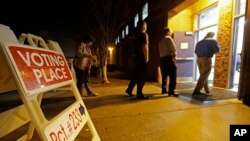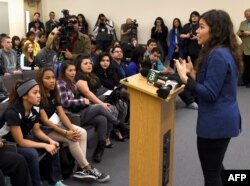As U.S. voters go to cast ballots for their next president in November, some will be turned away from polling places because of state laws that require showing identification.
Those laws, especially the most restrictive measures requiring a government-issued photo ID, are a relatively new phenomenon in the United States that have risen sharply during the past decade.
Voter ID laws are now active in 33 of the 50 U.S. states, covering about 60 percent of the population. Since President Barack Obama was elected in 2008, 11 states have enacted identification requirements for voting. The rules in those states range from strictly asking for photo IDs such as a driver's license to simpler documents such as a paycheck.
Proponents say the laws prevent voter fraud and give the public more confidence in the process.
"Voter ID can prevent and deter impersonation fraud, voting under fictitious voter registrations, double voting by individuals registered in more than one state, and voting by illegal aliens," Don Palmer, a former election official in Virginia and Florida, wrote in a Heritage Foundation report.
Palmer argued that those who oppose the laws exaggerate the number of people who are affected, and that those assertions inhibit the national debate.
Election turnout
According to the Federal Election Commission, 129 million people voted in the 2012 presidential election. That was about 55 percent of the voting age population, down from about 58 percent in 2008.
Many factors can account for lower election turnout, but a University of California, San Diego report released in February found no apparent relationship between the strict photo ID laws and overall voter turnout.
What the authors did find, however, was that while the laws had little impact on white voters, they reduced turnout among Hispanics, African-Americans and mixed-race voters.
"The key test is not whether turnout is lower in strict voter ID states but instead whether the turnout gap between whites and non-whites is greater in strict voter ID states."
The report said a lack of identification is particularly found among minorities, the poor and younger people.
A U.S. Government Accountability Office report cited a few of the reasons people struggle to obtain government identification. Some people lack transportation to get to the appropriate government office, while others do not have the necessary documents -- like a birth certificate -- to get the card. The GAO also cited the cost of state driver's licenses, though many of the states that require voters to have ID provide a free form of identification.
Still others who are employed, especially those in part-time work or jobs that do not provide any form of leave, cannot afford to skip work in order to get to a government office during the hours it is open.
Right to vote
Attorney General Eric Holder stressed in a 2012 speech the need to be vigilant in preventing voting fraud, but that "political pretexts" will not be allowed to keep Americans from exercising "their most precious right."
"The arc of American history has always moved toward expanding the electorate. It is what has made this nation exceptional. We will simply not allow this era to be the beginning of the reversal of that historic progress."
Opponents of the laws have also argued there is a huge imbalance between the cost voters and states incur to follow the rules and the small number of reported incidents of fraud the laws could prevent.
Ahead of the 2012 election, Justin Levitt wrote in a report for the American Constitution Society for Law and Policy that evidence of such fraud is "extraordinarily rare."
"Though it does occur, there are only a handful of recent accounts. During this same period, hundreds of millions of ballots have been cast."
Levitt said there is a reason many states offer voters alternatives to photo IDs to prove their identity and have their votes count.
"They recognize that there are some legitimate, eligible American citizens who do not possess government-issued photo identification cards. And they do not wish to make it unduly difficult for these citizens to exercise the most fundamental right in our constitutional order."













